30 have author last names that start with U have author last names that start with U


Between 1876 and 1945, thousands of Japanese civilians—merchants, traders, prostitutes, journalists, teachers, and adventurers—left their homeland for a new life on the Korean peninsula. Although most migrants were guided primarily by personal profit and only secondarily by national interest, their mundane lives and the state’s ambitions were inextricably entwined in the rise of imperial Japan. Despite having formed one of the largest colonial communities in the twentieth century, these settlers and their empire-building activities have all but vanished from the public memory of Japan’s presence in Korea.
Drawing on previously unused materials in multi-language archives, Jun Uchida looks behind the official organs of state and military control to focus on the obscured history of these settlers, especially the first generation of “pioneers” between the 1910s and 1930s who actively mediated the colonial management of Korea as its grassroots movers and shakers. By uncovering the downplayed but dynamic role played by settler leaders who operated among multiple parties—between the settler community and the Government-General, between Japanese colonizer and Korean colonized, between colony and metropole—this study examines how these “brokers of empire” advanced their commercial and political interests while contributing to the expansionist project of imperial Japan.


Where is the line that separates the “normal” from the “abnormal”? Liubov, a young Ukrainian woman of small nobility, struggles with this question in Lesia Ukrainka’s The Blue Rose. Living in Ukraine at the turn of the twentieth century, she finds herself outside the norms for a woman: she reads “thick books,” follows music and art, and is interested in science and psychology. She hosts a salon and challenges men in discussions about politics and culture. Liubov is also an orphan whose mother died in an asylum, and she worries about inheriting her mother’s disease as well as passing it on to future children. When Liubov falls in love with Orest, she proposes a radical solution to her dilemma: to pursue something as rare as a blue flower—“pure love” that foregoes the physical and abandons the requirement of marriage and motherhood.
In her commanding debut as a playwright, Ukrainka created a deep psychological rendering of an unattainable ideal. The Blue Rose highlights themes such as women’s struggles for liberation, social progress and its reliance on science, and resistance to change in traditional societies. Written in sophisticated Ukrainian, Ukrainka’s nuanced play helped Ukrainian culture break free of the Russian imperial mold that sought to first provincialize and then erase it. Presented here in contemporary English translation, The Blue Rose illuminates Ukraine’s intellectual history and its connections with Western culture.

Where is the line that separates the “normal” from the “abnormal”? Liubov, a young Ukrainian woman of small nobility, struggles with this question in Lesia Ukrainka’s The Blue Rose. Living in Ukraine at the turn of the twentieth century, she finds herself outside the norms for a woman: she reads “thick books,” follows music and art, and is interested in science and psychology. She hosts a salon and challenges men in discussions about politics and culture. Liubov is also an orphan whose mother died in an asylum, and she worries about inheriting her mother’s disease as well as passing it on to future children. When Liubov falls in love with Orest, she proposes a radical solution to her dilemma: to pursue something as rare as a blue flower—“pure love” that foregoes the physical and abandons the requirement of marriage and motherhood.
In her commanding debut as a playwright, Ukrainka created a deep psychological rendering of an unattainable ideal. The Blue Rose highlights themes such as women’s struggles for liberation, social progress and its reliance on science, and resistance to change in traditional societies. Written in sophisticated Ukrainian, Ukrainka’s nuanced play helped Ukrainian culture break free of the Russian imperial mold that sought to first provincialize and then erase it. Presented here in contemporary English translation, The Blue Rose illuminates Ukraine’s intellectual history and its connections with Western culture.

Cassandra, the daughter of King Priam of Troy, is cursed with the gift of true prophecies that are not believed by anyone. She foretells the city’s fall should Paris bring Helen as his wife, as well as the death of several of Troy’s heroes and her family. The classic myth turns into much more in Lesia Ukrainka’s rendering: Cassandra’s prophecies are uttered in highly poetic language—fitting for the genre of the work—and are not believed for that reason, rather than because of Apollo’s curse. Cassandra as poet and as woman are the focal points of the drama.
Cassandra: A Dramatic Poem encapsulates the complexities of Ukrainka’s late works: use of classical mythology and her intertextual practice; intense focus on issues of colonialism and cultural subjugation—and allegorical reading of the asymmetric relationship of Ukrainian and Russian culture; a sharp commentary on patriarchy and the subjugation of women; and the dilemma of the writer-seer who knows the truth and its ominous implications but is powerless to impart that to contemporaries and countrymen.
This strongly autobiographical work commanded a significant critical reception in Ukraine and projects Ukrainka into the new Ukrainian cultural canon. Presented here in a contemporary and sophisticated English translation attuned to psychological nuance, it is sure to attract the attention of the modern-day reader.

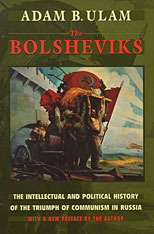

In a book of keen perception and vast sweep, a foremost scholar examines one hundred years of Russian revolutionary thought and the men who shaped and were caught up in it. Adam Ulam displays an unusual ability to penetrate the core of the Soviet mind as it evolved and was encapsulated in history.
Why did the Russians sign a treaty with Hitler? Why did they build a Berlin Wall, rattle missiles, and then sign a nuclear-test-ban treaty with President Kennedy? Why do they fear Titoism? Why was detente fostered when Nixon was president? By reflecting on the psychology, ideology, and frenetic activity of revolutionary Russians, Ulam leads us to answers.
Ulam's ability to explain events by tracing the continuities in the Russian mentality makes this work a special achievement in Soviet studies and intellectual history.




More than fifty years ago the discovery of scrolls in eleven caves beside the Dead Sea ignited the imagination of the world--and launched a vast academic field. Expectations abounded that the scrolls would reveal actual contemporaneous accounts of the birth of Christianity, perhaps even of the life of Jesus. The research that followed--its inner logic, and what its impassioned and often highly controversial theories reveal about the framing of facts and the interpreting of texts--is what interests philosopher Edna Ullmann-Margalit in this thoroughly absorbing book.
Since the inception of Dead Sea Scrolls research, a central theory has emerged. Known as the Qumran-Essene Hypothesis, it asserts that the scrolls belonged to the Essenes, a sect whose center was at the nearby site of Qumran. In Out of the Cave, Ullmann-Margalit focuses on this theory and the vicissitudes of its career. Looking at the Essene connection, the archaeology of Qumran, and the sectarian nature of the scrolls community, she explores the different arenas, and ways, in which contesting theories of the scrolls do battle. In this context she finds fascinating examples of issues that exercise philosophers of science as well as the general public--issues that only amplify the already intrinsic interest of the Dead Sea scrolls.


The national trade union is the dominant institution in the American labor movement. In this book the author analyzes its emergence and development in the latter half of the nineteenth and early part of the twentieth centuries. It was during this period that the labor union as a nationwide organization achieved dominance over other labor institutions.
The author discusses first the historical factors affecting trade union development. The body of the book covers the various stages in the evolution of union membership, organization, and government. An integral part of these chapters is a comparison of the national union movement in America and in Great Britain. The book concludes with a presentation of the interrelationships of the unions, and with a discussion of their relations with employers.
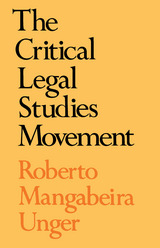
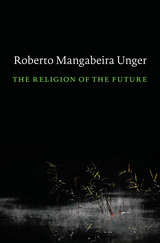
How can we live in such a way that we die only once? How can we organize a society that gives us a better chance to be fully alive? How can we reinvent religion so that it liberates us instead of consoling us?
These questions stand at the center of Roberto Mangabeira Unger’s The Religion of the Future. Both a book about religion and a religious work in its own right, it proposes the content of a religion that can survive faith in a transcendent God and in life after death. According to this religion—the religion of the future—human beings can be more human by becoming more godlike, not just later, in another life or another time, but right now, on Earth and in their own lives.
Unger begins by facing the irreparable flaws in the human condition: our mortality, groundlessness, and insatiability. He goes on to discuss the conflicting approaches to existence that have dominated the last 2,500 years of the history of religion. Turning next to the religious revolution that we now require, he explores the political ideal of this revolution, an idea of deep freedom. And he develops its moral vision, focused on a refusal to squander life.
The Religion of the Future advances Unger’s philosophical program: a philosophy for which history is open, the new can happen, and belittlement need not be our fate.
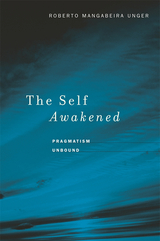
In what kind of world and for what kind of thought is time real, history open, and novelty possible? In what kind of world and for what kind of thought does it make sense for a human being to look for trouble rather than to stay out of trouble?In this long-awaited work of general philosophy, Roberto Mangabeira Unger proposes a radical reorientation of established ideas about nature, mind, society, politics, and religion. He shows how we have to change our beliefs if we are to succeed in doing justice to our most distinctive contemporary experiences, discoveries, and ideals.
The Self Awakened mobilizes the resources of several philosophical traditions, and develops the unrecognized revolutionary implications of the most influential of these traditions today--pragmatism. Avoiding technical jargon and needless complication, this book makes a case for philosophy as the supreme activity of the intellect at war, insisting on its power to deal with what matters most.

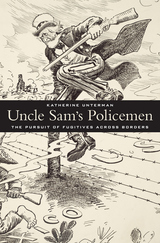
Extraordinary rendition—the practice of abducting criminal suspects in locations around the world—has been criticized as an unprecedented expansion of U.S. police powers. But America’s aggressive pursuit of fugitives beyond its borders far predates the global war on terror. Uncle Sam’s Policemen investigates the history of international manhunts, arguing that the extension of U.S. law enforcement into foreign jurisdictions at the turn of the twentieth century forms an important chapter in the story of American empire.
In the late 1800s, expanding networks of railroads and steamships made it increasingly easy for criminals to evade justice. Recognizing that domestic law and order depended on projecting legal authority abroad, President Theodore Roosevelt declared in 1903 that the United States would “leave no place on earth” for criminals to hide. Charting the rapid growth of extradition law, Katherine Unterman shows that the United States had fifty-eight treaties with thirty-six nations by 1900—more than any other country. American diplomats put pressure on countries that served as extradition havens, particularly in Latin America, and cloak-and-dagger tactics such as the kidnapping of fugitives by Pinkerton detectives were fair game—a practice explicitly condoned by the U.S. Supreme Court.
The most wanted fugitives of this period were not anarchists and political agitators but embezzlers and defrauders—criminals who threatened the emerging corporate capitalist order. By the early twentieth century, the long arm of American law stretched around the globe, creating an informal empire that complemented both military and economic might.

In his comprehensive study of types from the earliest times to the twentieth century, Updike, founder of the famous Merrymount Press of Boston, traces the sequence of development in typography and discusses the relative importance of each period and the lesson that it holds for the modern printer. The 367 illustrations reproduce carefully selected pages from rare and beautiful books. The text constitutes a running commentary on the historical and artistic significance of these specimens, which exemplify the best work of printers and type founders from Gutenberg to Bruce Rogers. The closing chapters on choice of type and on the industrial conditions of the past and their relationship to the problem of printers today are particularly valuable.
Printing Types is the master work of a master printer, collecting in two volumes a wealth of material once scattered through widely diverse sources. Everyone interested in the graphic arts will welcome the reissue of this classic on the art of printing.

In his comprehensive study of types from the earliest times to the twentieth century, Daniel Berkeley Updike, founder of the famous Merrymount Press of Boston, traces the sequence of development in typography and discusses the relative importance of each period and the lesson that it holds for the modern printer. The 367 illustrations reproduce carefully selected pages from rare and beautiful books. The text constitutes a running commentary on the historical and artistic significance of these specimens, which exemplify the best work of printers and type founders from Gutenberg to Bruce Rogers. The closing chapters on choice of type and on the industrial conditions of the past and their relationship to the problem of printers today are particularly valuable.
Printing Types is the master work of a master printer, collecting in two volumes a wealth of material once scattered through widely diverse sources. Everyone interested in the graphic arts will welcome the reissue of this classic on the art of printing.
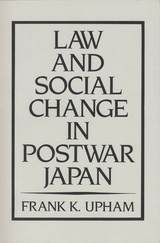
Many people believe that conflict in the well-disciplined Japanese society is so rare that the Japanese legal system is of minor importance. Frank Upham shows conclusively that this view is mistaken and demonstrates that the law is extensively used, on the one hand, by aggrieved groups to articulate their troubles and mobilize political support and, on the other, by the government to channel and manage conflict after it has arisen.
This is the first Western book to take law seriously as an integral part of the dynamics of Japanese business and society, and to show how an informal legal system can work in a complex industrial democracy. Upham does this by focusing on four recent controversies with broad social implications: first, how Japan dealt with the world’s worst industrial pollution and eventually became a model for Western environmental reforms; second, how the police and courts have allowed one Japanese outcast group to use carefully orchestrated physical coercion to achieve wide-ranging affirmative action programs; third, how Japanese working women used the courts to force employers to eliminate many forms of discrimination and eventually convinced the government to pass an equal employment opportunity act; and, finally, how the Ministry of International Trade and Industry and various sectors of Japanese industry have used legal doctrine to cope with the dramatic changes in Japan’s economy over the last twenty-five years.
Readers interested in the interaction of law and society generally; those interested in contemporary Japanese sociology, politics, and anthropology; and American lawyers, businessmen, and government officials who want to understand how law works in Japan will all need this unusual new book.
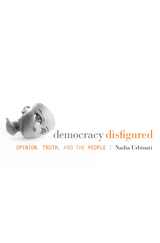
In Democracy Disfigured, Nadia Urbinati diagnoses the ills that beset the body politic in an age of hyper-partisanship and media monopolies and offers a spirited defense of the messy compromises and contentious outcomes that define democracy.
Urbinati identifies three types of democratic disfiguration: the unpolitical, the populist, and the plebiscitarian. Each undermines a crucial division that a well-functioning democracy must preserve: the wall separating the free forum of public opinion from the governmental institutions that enact the will of the people. Unpolitical democracy delegitimizes political opinion in favor of expertise. Populist democracy radically polarizes the public forum in which opinion is debated. And plebiscitary democracy overvalues the aesthetic and nonrational aspects of opinion. For Urbinati, democracy entails a permanent struggle to make visible the issues that citizens deem central to their lives. Opinion is thus a form of action as important as the mechanisms that organize votes and mobilize decisions.
Urbinati focuses less on the overt enemies of democracy than on those who pose as its friends: technocrats wedded to procedure, demagogues who make glib appeals to “the people,” and media operatives who, given their preference, would turn governance into a spectator sport and citizens into fans of opposing teams.
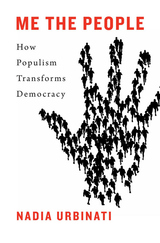
A timely and incisive assessment of what the success of populism means for democracy.
Populist movements have recently appeared in nearly every democracy around the world. Yet our grasp of this disruptive political phenomenon remains woefully inadequate. Politicians of all stripes appeal to the interests of the people, and every opposition party campaigns against the current establishment. What, then, distinguishes populism from run-of-the-mill democratic politics? And why should we be concerned by its rise?
In Me the People, Nadia Urbinati argues that populism should be regarded as a new form of representative government, one based on a direct relationship between the leader and those the leader defines as the “good” or “right” people. Populist leaders claim to speak to and for the people without the need for intermediaries—in particular, political parties and independent media—whom they blame for betraying the interests of the ordinary many. Urbinati shows that, while populist governments remain importantly distinct from dictatorial or fascist regimes, their dependence on the will of the leader, along with their willingness to exclude the interests of those deemed outside the bounds of the “good” or “right” people, stretches constitutional democracy to its limits and opens a pathway to authoritarianism.
Weaving together theoretical analysis, the history of political thought, and current affairs, Me the People presents an original and illuminating account of populism and its relation to democracy.
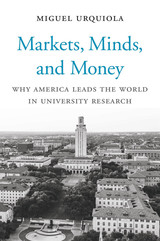
A colorful history of US research universities, and a market-based theory of their global success.
American education has its share of problems, but it excels in at least one area: university-based research. That’s why American universities have produced more Nobel Prize winners than those of the next twenty-nine countries combined. Economist Miguel Urquiola argues that the principal source of this triumph is a free-market approach to higher education.
Until the late nineteenth century, research at American universities was largely an afterthought, suffering for the same reason that it now prospers: the free market permits institutional self-rule. Most universities exploited that flexibility to provide what well-heeled families and church benefactors wanted. They taught denominationally appropriate materials and produced the next generation of regional elites, no matter the students’—or their instructors’—competence. These schools were nothing like the German universities that led the world in research and advanced training. The American system only began to shift when certain universities, free to change their business model, realized there was demand in the industrial economy for students who were taught by experts and sorted by talent rather than breeding. Cornell and Johns Hopkins led the way, followed by Harvard, Columbia, and a few dozen others that remain centers of research. By the 1920s the United States was well on its way to producing the best university research.
Free markets are not the solution for all educational problems. Urquiola explains why they are less successful at the primary and secondary level, areas in which the United States often lags. But the entrepreneurial spirit has certainly been the key to American leadership in the research sector that is so crucial to economic success.
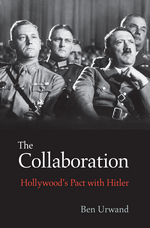
To continue doing business in Germany after Hitler's ascent to power, Hollywood studios agreed not to make films that attacked the Nazis or condemned Germany's persecution of Jews. Ben Urwand reveals this bargain for the first time—a "collaboration" (Zusammenarbeit) that drew in a cast of characters ranging from notorious German political leaders such as Goebbels to Hollywood icons such as Louis B. Mayer.
At the center of Urwand's story is Hitler himself, who was obsessed with movies and recognized their power to shape public opinion. In December 1930, his Party rioted against the Berlin screening of All Quiet on the Western Front, which led to a chain of unfortunate events and decisions. Fearful of losing access to the German market, all of the Hollywood studios started making concessions to the German government, and when Hitler came to power in January 1933, the studios—many of which were headed by Jews—began dealing with his representatives directly.
Urwand shows that the arrangement remained in place through the 1930s, as Hollywood studios met regularly with the German consul in Los Angeles and changed or canceled movies according to his wishes. Paramount and Fox invested profits made from the German market in German newsreels, while MGM financed the production of German armaments. Painstakingly marshaling previously unexamined archival evidence, The Collaboration raises the curtain on a hidden episode in Hollywood—and American—history.

A quiet revolution came to corporate America during the late 1980s and early 1990s. Large shareholders—pension funds, insurance companies, money manages, and commercial banks—exercised new-found muscle, pressuring senior managers to improve disappointing financial results by reshaping their organization. Michael Useem reveals how those investor pressures have transformed the inside structures of many corporations, better aligning them with shareholder interest.
Useem draws on numerous sources, including interviews with senior managers and intensive studies of seven large corporations representing a range of restructuring experiences and industries—including pharmaceuticals, transportation, chemicals, retailing, electronics, and financial services. He shows that organizational changes have affected many areas of corporate life: headquarters staffs have been reduced authority has filtered down to operating units, and compensation has become more closely tied to performance. Change also extends to corporate governance, where managers have fought back by seeking legal safeguards against takeovers and by staggering board terms. They’ve also put significant resources into building more effective relations with shareholders.
As Useem demonstrates, this revolution has reached beyond the corporation, influencing American politics and law. As increasing ownership concentration has caused companies to focus more attention on shareholders, corporate political agendas have shifted from fighting government regulation to resisting shareholder intrusion.

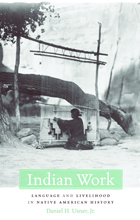
Representations of Indian economic life have played an integral role in discourses about poverty, social policy, and cultural difference but have received surprisingly little attention. Daniel Usner dismantles ideological characterizations of Indian livelihood to reveal the intricacy of economic adaptations in American Indian history.
Officials, reformers, anthropologists, and artists produced images that exacerbated Indians’ economic uncertainty and vulnerability. From Jeffersonian agrarianism to Jazz Age primitivism, European American ideologies not only obscured Indian struggles for survival but also operated as obstacles to their success. Diversification and itinerancy became economic strategies for many Indians, but were generally maligned in the early United States. Indians repeatedly found themselves working in spaces that reinforced misrepresentation and exploitation. Taking advantage of narrow economic opportunities often meant risking cultural integrity and personal dignity: while sales of baskets made by Louisiana Indian women contributed to their identity and community, it encouraged white perceptions of passivity and dependence. When non-Indian consumption of Indian culture emerged in the early twentieth century, even this friendlier market posed challenges to Indian labor and enterprise. The consequences of this dilemma persist today.
Usner reveals that Indian engagement with commerce has consistently defied the narrow choices that observers insisted upon seeing.
READERS
Browse our collection.
PUBLISHERS
See BiblioVault's publisher services.
STUDENT SERVICES
Files for college accessibility offices.
UChicago Accessibility Resources
home | accessibility | search | about | contact us
BiblioVault ® 2001 - 2024
The University of Chicago Press









